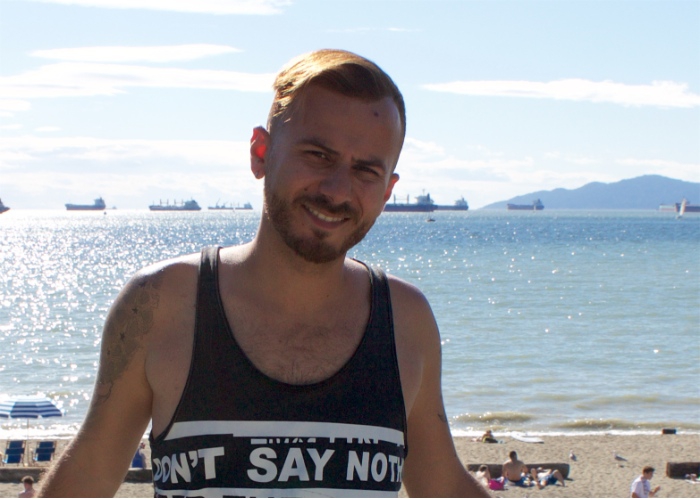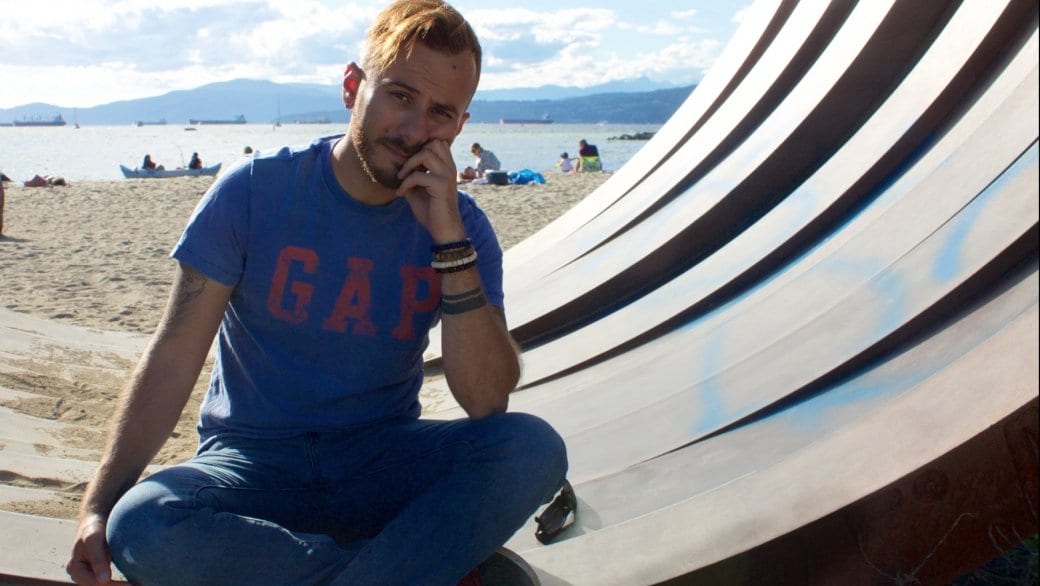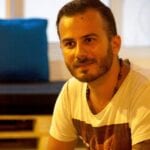I’m disappointed.
I’m not angry, I’m not upset, I’m not even sad. I’m just disappointed.
Remember when I used to write my column back in Beirut, when I was a Syrian gay refugee trying to figure out life for myself then, while I waited for my visa to come to Canada?
Life back then was hopeful, filled with dreams and possibilities. I used to sleep dreaming of coming here to Canada and being — finally — in a safe place to represent my true identity. I dreamed of a place where I would wear my rainbow colours and walk tall and proud on Davie Street. I had visions of living on the corner of Davie and Bute, and of having my coffee every morning on my balcony, overlooking the rainbow crossroad.
I dreamed of being happy with who I am.
When I arrived in Vancouver in September 2014 — literally from my first day here in Canada — I sensed a social dynamic that I did not fully understand at first. It felt like a deafening buzz in a broken stereo. I could hear it over the music of my life. I examined that imaginary stereo, shook it, made sure all the plugs were in the right places, yet that buzz wouldn’t disappear.
I was treated differently by those around me.
Sometimes, I was treated like a delicate flower, a Syrian refugee stereotyped as incapable of making my own decisions — easily broken, fragile to the touch.
Sometimes, I was treated as a lesser person, whose boundaries and privacy were secondary to most people, who instead indulged their curiosity about me. Invasive questions became a habit for strangers I’d never met before, and if I resisted responding to their questions, I would be seen as rude and unappreciative — as if my right of privacy and self-determination was somehow in bad taste.
I wasn’t celebrated for who I am as a new addition to the Canadian society; I was pointed to as living proof for others to celebrate their achievement in bringing me here.
Then, one day, months after I arrived here, I came to understand the impact of my immigration upon the intersectionality of my identity. I’m not just a gay refugee anymore; I’m more complicated than that. I’m now a queer immigrant person of colour, with a past refugee experience, in the white-centric gay community of Vancouver, BC.
The burden of fighting to establish myself back in the Middle East as a gay man was replaced by the burden of fighting to establish myself here in Vancouver, as a queer person of colour.
This might seem like a trivial detail to you; we both know that Canada is not a racist country. We both agree that diversity is the strength of the Canadian society and what makes Canada the only sane Western country, while the UK is leaving the EU, and Donald Trump is screaming xenophobic slurs in American stadiums.
But here is my point: racism is not just the hateful act of calling someone a racist slur, or stereotyping a whole race. Racism is a spectrum of colours, ways and actions that leave their marks on the souls of people of colour, even if they didn’t share that hurt with you.
Othering, cultural appropriation and micro-aggressions are racist concepts, even when they hide behind a polite face or a curious one.
Let me give you an example.

Ahmed Danny Ramadan at English Bay in July 2016. (Mike Carter/Daily Xtra)
When you, as a single queer person, go to a dance club on a Saturday night, you have many hopes and dreams about your evening. You want to dance, listen to a good beat, enjoy a beer with friends, possibly get hit on by a hottie, dance a bit, possibly make out in the line to the bathroom, and maybe end the night in bed with the hottie.
When someone across the bar comes your way, smiling, and starts flirting with you, they might point out that your eyes are soulful, your body is inviting, and your lips are delicious or even slip a snooping hand under your shirt.
When I’m approached by a white person at the club, their first question is always: “Where are you from?”
This is an othering question.
Ask yourself before you utter those words: Would this be my first question to another white guy I’m attempting to hook up with at a club?
Now, I have two options to answer that question.
One: I tell the person that I’m from Vancouver. Since I immigrated here, part of my process to belong here is to claim this city as my own. I’m working in its community, befriending its people, walking its streets and loving its food. This is a truthful answer to this question.
However, if I pick this option, the next question that I always get is: “No, I mean, where are you really from?”
I’m a refugee; I lost my country to the wind of war. I need a patch of land to call my own, and this follow-up question is rejecting my truth that I shared with you, and insisting on invading my privacy and my right to avoid questions I’m not comfortable answering.
Option two: I avoid the dilemma of Option One all together, and state that I’m from Syria. “Syria!” they usually say in amusement, “that must have been horrible!” Then, if they don’t lose interest right away, they ask me to narrate horror stories about my refugee years, or coming here to Canada.
I don’t blame you. I blame your media that represent my country as an endless desert with veiled women and terrorists in long beards. I don’t blame you, but I wish from the bottom of my heart that you’d educate yourself a tiny bit about the biggest humanitarian crisis in our recent history.
Syria has rivers and mountains; it has green trees and forests. In winter it gets rainy and cold, sometimes it snows.
Also, Syria is the place where I wore my first shorts, the place I climbed my first tree, and the place I kissed a boy for the first time. Horrible and beautiful can coexist in the memory of a person of colour when they think of their country of origins. Your assumptions, based on how the First World sees the Third World, are not accurate; they’re a privilege you have, a power you hold over our heads.
I’m disappointed by the people in bars who flirt with me by asking me where I’m from or if they can touch my “hairy Arabian chest,” or if I’m from the country of “Aladdin.”
My true identity evolved in the past two years. I realize who I am, and I want to keep my integrity and my respect for my culture, and myself.
Many people of colour, dear friends of mine, who come here, costume themselves to fit in the box moulded to them by the white society around them. But I don’t want to fit in a box. I became a refugee, and crossed oceans and lands until I got here so I could escape being forced into a heterosexual box.
We can do better, Canada can do better. I dreamed of Canada even before I came to it, and the Canada I dreamed of is here. I see it. I know it can do better.
I hear the murmurs in the gay community, people calling me “difficult,” “challenging,” “angry,” and “undatable.” But I will be honest with you, I don’t want to be a fun fetish on anyone’s bucket list. I want people to love me for who I am, who I am deep inside, as a person, as a human. I want you to respect my intersectionality, my brownness, my Arabic, my accent and my heritage.
When you love me, respect me for who I am. I promise you, I will then be your prince.
But I refuse to be your Aladdin.


 Why you can trust Xtra
Why you can trust Xtra


